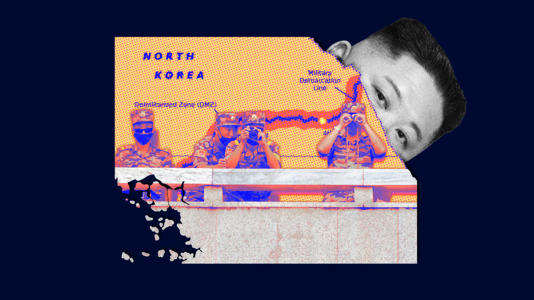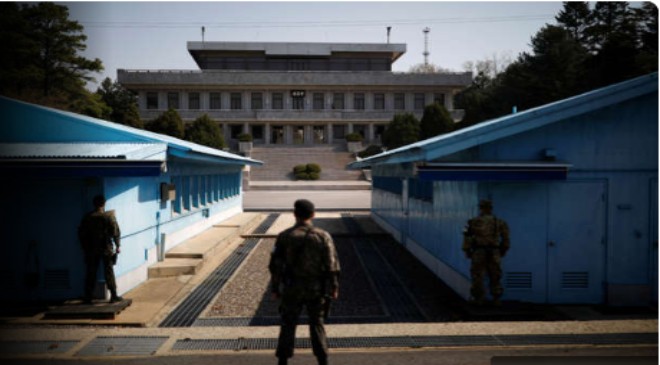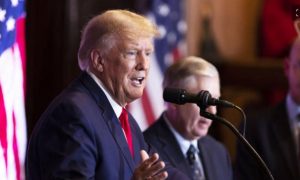The “truce village” straddling the line between North and South Korea where the Korean War armistice was signed 70 years ago is now more like a sieve than a barrier to anyone thinking of leaping to the other side.

Bizarrely, it’s North Korea’s caution that has left them so exposed.
“There are no North Korean guards because of the COVID lockdown on their side,” said Victor Cha, who served as Asia director at the National Security Council when George W. Bush was president. Once Army Private Second-Class Travis King “made a break for it,” Cha told The Daily Beast, the American and South Korean military guides “can’t run after him.”—that is, across the line into the North in the truce village of Panmunjom 35 miles north of Seoul.
Also Read– S. Korea to support civilian aid to North in hopes of talks
In the face of rising tensions and threats of reprisals by both sides, the ease with which the disgruntled soldier made it into North Korea exposes the sheer weakness of what is supposed to be the world’s most highly defended border between two hostile states.
“The North Koreans have been almost invisible since COVID,” said Steve Tharp, a retired U.S. army officer who often was detailed to the JSA. He said they’re rarely seen where they once stood on their side, sometimes muttering obscene insults to American and South Korean soldiers a few feet away.
When they do appear, said Tharp, they are generally wearing hazmat suits to shield them from contamination by the South Koreans, whom North Korea blames for spreading COVID on breezes blowing from south to north. North Korea closed its borders in early 2020 after COVID was first reported in China.
Also Read– S. Korea to support civilian aid to North in hopes of talks
“King simply broke away from the tour group and crossed the line into North Korea,” said David Maxwell, a former army special forces colonel who served five tours in South Korea.
Unlike the North Koreans, South Korean and U.S. soldiers “are not going to chase or shoot at a defector,” said Maxwell, now with the Foundation for Defense of Democracies in Washington. “Anyone with the intent to cross the military demarcation line at the Joint Security Area could do so easily. The only thing that could be done was to put up a wall of guards or simply cancel tours (which I am sure has been done).”
Also Read– Earth’s inner core may have stopped turning and could go into reverse, study suggests
Evans Revere, one-time chief of mission of the American embassy in Seoul, recalled there’s almost nothing to stop a determined bolter from dashing across the line. “I’ve been to the JSA dozens of times,” he said. “Once you are present on Conference Row there are no real impediments to crossing over to the other side, if that is your intention.”
When Revere was based in Seoul, armed guards from both sides faced one another between aluminum-roofed structures built right on the line. Under the Comprehensive Military Agreement reached between North and South Korea four years ago, the guards are not only unarmed but no longer standing between the buildings.
“There’s no physical barrier,” said Revere. “There are several places on Conference Row where a determined individual could easily wander off from the tour group.” It’s all a matter of the would-be defector’s willingness to expose himself as a target for North Korean soldiers.
Also Read– Google accuses India antitrust body of protecting Amazon in Android probe
“Defecting at Panmunjom is risky,” said David Straub, who served for years as political officer at the American embassy in Seoul and has visited North Korea on official missions. “The defector himself could be shot, and defection risks triggering a shootout among the armed guards there.”
Still, said Straub, “a number of people on both sides have defected via Panmunjom over the decades because it is less risky and requires far less knowledge and planning than crossing elsewhere in the DMZ”—that is, the 2-1/2 mile-wide demilitarized zone that runs 154 miles across the peninsula where the shooting stopped on July 27, 1953.
These days, since they are unarmed, American and South Korean soldiers within the Joint Security Area would not be able to open fire even if they wanted to. Nor are the North Koreans supposed to be carrying weapons, though it is not clear how closely they’re sticking to a deal that was intended to ease North-South tensions.
Also Read– Millions who rely on Medicaid may be booted from program
Tharp saw the danger of anyone defecting from South to North Korea as having appeared so slight as not to have been a serious concern until it happened.
“Because defecting to North Korea is not normal, that is not a high priority—until now,” he said. “All that someone needs is the element of surprise and a small gap, and they can get across the line before being caught.”
Cha, long-time Korea director at the Center for Strategic and International Studies in Washington, said, “Tour groups usually are not allowed to walk up to the military demarcation line but are allowed to loiter on the United Nations side… That probably won’t be allowed anymore. One person ruins it for everyone.”
Maxwell defended the record of the Americans and South Koreans in guaranteeing security, at least outside the JSA.
Also Read- Biden administration doesn’t want doctors prescribing controlled substances remotely
“The accusation that security is lax is just not warranted,” he said. “Neither the South Korean nor U.S. soldiers are on the lookout for defectors. They are more concerned with threats to the people from the North Koreans even though they are now generally completely out of sight since COVID.”
The southern barrier of the DMZ, he said, “is heavily patrolled, has cameras, and raked sand to reveal footprints.”
For the North Koreans, he said, “the focus is on infiltrators from the North not defectors from the South.” Maxwell recalled seeing a mine detonate on the northern side on Christmas Day in 1987 while he was on a daylight reconnaissance patrol with his scout platoon.
To the American and South Korean commands, however, King’s defection says much more about security on the South Korean side despite repeated threats from North Korea’s leader Kim Jong Un and little sister Kim Yo Jong of nuclear attack and the launch of intermediate-range ballistic missiles capable of carrying nuclear warheads to targets in the U.S.
Both American and South Korean border soldiers were “riding herd” on the group from which King suddenly defected, said Tharp. “The guards were shadowing the tour,” he said, but obviously were not nearly close enough to grab King after he laughed loudly and ran for the line.
No North Korean soldiers were visible on their side, but they presumably grabbed King when he reached the two-story building known as Panmungak another 100 meters inside North Korea.
Now, said Tharp, “the tours will be closed for an indefinite period” while the Americans and South Koreans “do a review and figure out changes”—undoubtedly in the form of posting more unarmed guards and vetting all those who want to join DMZ tours.
Also Read- New Mexico governor pans Forest Service amid wild cow fight
Had they bothered to check out King, they would have discovered that he had been jailed in South Korea for assault and was to have been flown to Fort Bliss, Texas, where he was to face U.S. military charges. After U.S. military police let him go at airport security, he sneaked out of the airport and signed up for the Panmunjom tour.
Tharp doubted the North Koreans would release him, just as they never released other American soldiers who defected to the North.
The last of six to cross into the North before King was Private First Class Joseph White, who North Korea said had drowned in a river in August 1985 three years after defecting on a patrol several miles from Panmunjom.
King is the first American soldier to have defected across the DMZ. The other six, including White, defected by leaving their patrols or bases, penetrating mine-infested territory, and breaching the barbed-wire barricade of the Demilitarized Zone,
All the others have died, most recently Charles Jenkins six years ago in Japan. Drunk on beer, he walked across the line while on patrol in 1965. Tortured and beaten, he was eventually allowed to marry a Japanese woman whom the North Koreans had kidnapped from a beach in Japan and told to teach Japanese. She was returned to Japan in 2002, and he and their two daughters were freed two years later.
“Something like this could obviously cause an international incident,” said Bruce Bechtol, a former intelligence analyst in the marines in Korea and then at the Pentagon. Jenkins “essentially walked across the DMZ,” said Bechtol, author of numerous books and articles on North Korea’s military leadership. “The North Koreans ended up using him for propaganda.”
Read more:- Inflation Eases, S&P 500 Cools As Banks Kick Off Q1 Earnings Season
The latest defection comes as the Americans and South Koreans step up joint military exercises amid escalating North Korean rhetoric. The nuclear submarine USS Kentucky, docking at the port of Busan, is the first nuclear sub to visit South Korea since 1981. The incident also coincides with a meeting in Seoul of the newly formed Nuclear Consultation Group in which Kurt Campbell, the National Security Council’s Indo-Pacific coordinator, is leading a large delegation, raising speculation about negotiations.
Colonel Maxwell doubted the North Koreans would succeed in using King’s defection as a bargaining tool. “We will not back down or make concessions to the North,” he told The Daily Beast. “There will be no such negotiation with a concession such as to make the submarine depart in return for the soldier.”
He believed, however, the North Koreans and the Americans might get into talks. “If the KPA is not picking up the phone at the JSA,” he said, “the UNC side will be broadcasting with a bullhorn requesting a meeting.”
Read More:-Taxpayers Have ‘Lack of Urgency’ To File by April 18 — Is an Extension Right for You?
Maxwell predicted that Smith’s defection might at most briefly serve propaganda purposes as tensions rise on the Korean peninsula. Pfc. White “was used for propaganda for a while but later died,” said Maxwell. “A similar fate probably awaits PC1 King.”
“This won’t resolve soon,” Victor Cha told The Daily Beast. “North Korea will maximize propaganda value. In the past detainees are held for weeks to months sometimes with a show trial, sentence, and then coerced apology. It usually takes someone to go get their release too. The only silver lining is that NK will have to answer the phone from the Biden administration to resolve this, which they have been unwilling to do thus far.”



























